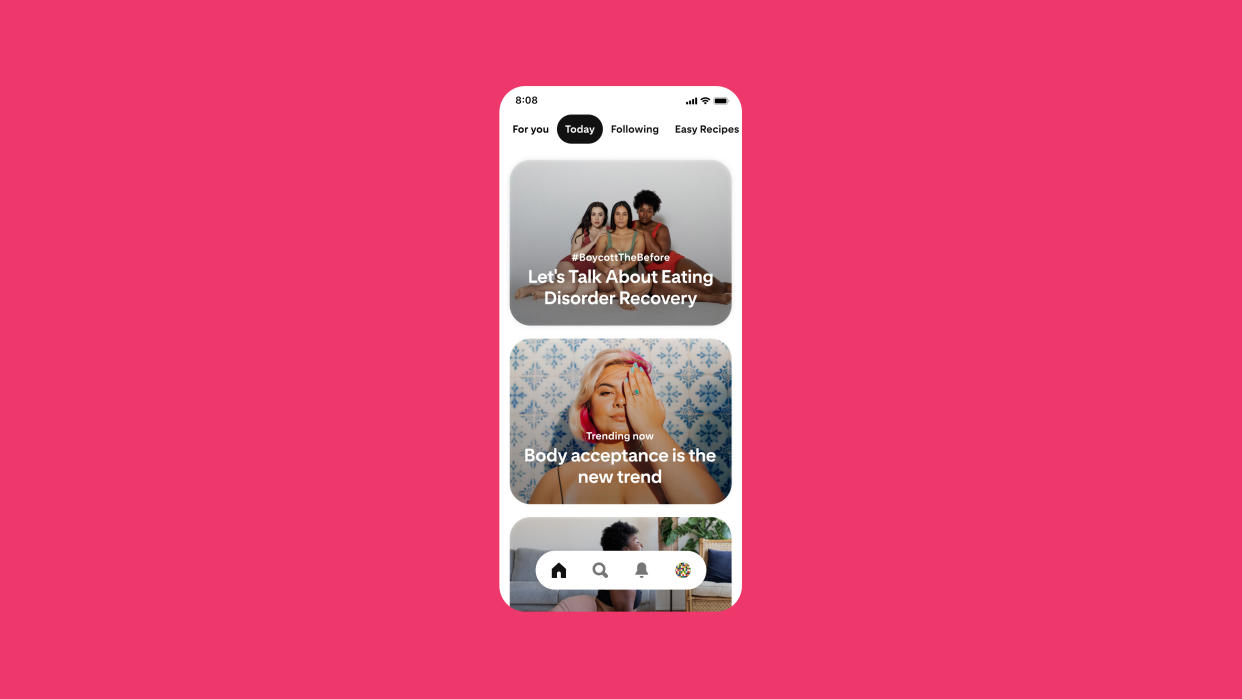Pinterest announces radical policy against weight loss ads

Pinterest is taking a stance in favor of users's mental health with a new policy that prohibits all ads with weight loss language and imagery.
The image sharing service that provides inspiration to millions of users announced the update on Thursday, noting that there is a particular threat to body image and mental health coming out of the coronavirus pandemic. "According to the US National Eating Disorders Association (NEDA) and the US National Association of Anorexia Nervosa and Associated Disorders (ANAD), there’s been a steep rise in unhealthy eating habits and eating disorders in young people since the COVID-19 pandemic started last year," a statement from the brand reads. "Many are now feeling added pressure as they look to rejoin their social circles in person for the first time in 15 months."
In order to combat some of those pressures, Pinterest aims to create a space where all people can come for inspiration and community, regardless of body shape or size. To do so, its new policies strictly prohibit "any weight loss language or imagery, any testimonials regarding weight loss or weight loss products, any language or imagery that idealizes or denigrates certain body types, referencing Body Mass Index (BMI) or similar indexes and any products that claim weight loss through something worn or applied to the skin."
Tabria Majors, a plus-size model and influencer who has created her own community on the site, tells Yahoo Life just how detrimental that type of content can be. "Diet culture is just so damaging to our psyche, to our mental health, to our self-esteem," she says. "It just ends up as a cycle of unhealthy dieting habits, eating habits, eating disorders, and just doing things to the absolute extreme."
Majors explains that she is no stranger to the "volatile" nature of social media, especially as a curvy woman who has been victim to the fatphobia that exists online. And while some of the negativity comes from trolls on the internet, she says that platforms often contribute to the problem.
"I've been shadow banned and I've been blocked for posting for days at a time just because my content was viewed as inappropriate, and I know a lot of other plus-size and disabled people have experienced the same thing," Majors says of platforms like Instagram and TikTok. "In the fine print of their terms and conditions, it's like in an effort to reduce bullying and harmful behavior, they purposely target these marginalized groups of people and hide or ban their content from trolls essentially and people just spewing verbal abuse on the internet. But I just hate how the people creating the content are the ones who are penalized for it and not the people who are abusing their privileges of using the apps."
Serving ads about weight loss, diet products and idealized body types only perpetuates that same fatphobia.
"I don't think we need to just bombard people with all this negative messaging about diet culture and beauty culture," Majors says. "I don't think there's a problem with anybody wanting to lose weight, but when you're coerced into believing that something is wrong with you and doing it as a result of that, that's where the damaging effects come in."
Pinterest once stood in the center of these issues after gaining a reputation for housing pro-anorexia content by enabling creators to post harmful words and imagery that ultimately started a trend of "thinspiration." After banning specific content that seemingly promoted eating disorders in 2012, however, the company has continued to make strides in becoming a more positive space and even teamed up with NEDA and ANAD to make necessary changes.
"The National Eating Disorders Association (NEDA) applauds Pinterest for taking a leadership position as the first platform to prohibit all ads with weight-loss language and imagery. NEDA is encouraged by this necessary step in prioritizing the mental health and well-being of Pinners, especially those impacted by diet culture, body shaming, and eating disorders," Elizabeth Thompson, Interim CEO for the US National Eating Disorders Association, said in a statement. "We are hopeful this global policy will encourage other organizations and companies to reflect on potentially harmful ad messages and to establish their own working policies that will create meaningful change."
While content and ads "promoting healthy lifestyles and habits or fitness services and products" will still exist on Pinterest, the company draws a strict boundary at any focus on weight loss that has the potential of rationalizing or encouraging eating disorders. In fact, with an uptick in searches of the term "body neutrality," Pinterest is ready to embrace any and all content that promotes self-acceptance.
Majors notes that she too has leaned into practicing body neutrality in order to combat the overwhelming amount of body shaming and body positivity content that she's run into online. "It's a good shift in the conversation because as opposed to just focusing so much on what your body looks like and how to make it better if you don't like it, I'm focusing more on what my body is capable of and what it does for me and how I should appreciate it more."
Read more from Yahoo Life:
Want lifestyle and wellness news delivered to your inbox? Sign up here for Yahoo Life’s newsletter.


